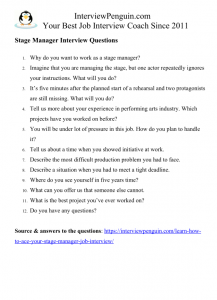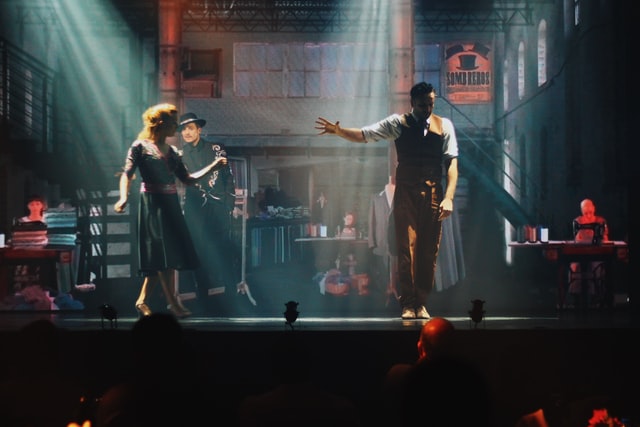Life’s a theater, and everyone is playing some role. People often get tired of their own acting, however, and want to look at someone else showing talents on stage. In an ideal case they should see someone playing something they can relate to in their imagination, something they do not dare to do, but the actors do–because at the end it’s just a game, a stage play, a movie. Many figures participate in planning and execution of each stage production. Stage manager is one of them.
Your primary role will be recording stage details, decided by the director, and promptly informing crew members and cast of what they should do, while the director sits calmly in his spot watching the show from a position of an observer. You will also help with scheduling rehearsal times, directing the staff behind the curtains, and basically ensuring that the action on stage follows the vision of the director. Let’s have a look at some questions you may face while interviewing for this interesting job.
Table of Contents
Why do you want to work as a stage manager?
Stage manager doesn’t need any artistic abilities–which is in stark contrast to almost everyone else in the film or theater crew. But they need strong management and organizational skills, attention to detail, ability to act quickly, and deliver under pressure.
You can say that you have all these skills. And because you love the environment of film studios and theaters and what not, and being around actors and other artists, this is a perfect job for you. Certainly with your skills you could manage a small team in some corporation or a smaller retail store. But you prefer to manage the stage, the people on stage, the crew members, following the directions of a director.
Imagine that you are managing the stage, but one actor repeatedly ignores your instructions. What will you do?
Communication is the key, though many actors have big egos and it is not easy communicating with them. Start by saying that you will have a short one on one with them, asking them what’s wrong, and why they cannot follow the instructions. Maybe they consider them stupid, maybe they hate you, and maybe they just had a long night out with alcohol and drugs and cannot really focus.
Finding the reason, you will try to address the situation accordingly. But you wont’s just let it go if they fail to obey again. Unless we talk about some big star, you may threaten them with cancelling their contract (and having to pay all associated damages), or with something else, to eventually make them obey the will of the director.
It’s five minutes after the planned start of a rehearsal and two protagonists are still missing. What will you do?
You can perhaps imagine the situation. Director is smoking a cigarette nervously, and the other actors are pacing the stage, or chattering about last night adventures. But someone has to get the missing actors, and the task is yours…
Try to show some creativeness here, and willingness to go above and beyond. Certainly you will try to call them, text them, what’s up them, whatever. But if they aren’t replying or something seems wrong you may jump in the car and go and grab them by the neck and drag them onstage.
You can also emphasize that once they finally show up (with or without your assistance), you will clearly explain them that such a situation cannot repeat again, unless they want to pay disciplinary fines or lose their contract. Twenty people cannot waste time waiting for two who are late. Its’ just not possible with the deadlines and everything…
Tell us more about your experience in performing arts industry. Which projects have you worked on before?
It’s good if you have at least some experience from the stage, be it from a position of some assistant, minor actor, sound engineer, anything. Not that it matters much in the job, but you’d know the professional jargon, how things typically flow on the stage, the roles of various crew members–including the stage manager.
If you lack experience, and still got a chance in an interview, ensure them that you understand the job description. You know what they will expect from you, and with your managerial experience and skills, you believe you will handle the job. Certainly you may not understand a word or two at the beginning, but you are a quick learner and certainly won’t have any issues after few days in the job. Showing a healthy level of confidence helps them to gain confidence in you…
You will be under lot of pressure in this job. How do you plan to handle it?
You have a few options for a good answer to this question. First one is saying that you actually work better under pressure. When you have to meet deadlines, when people expect a lot from you, it motivates you to stay extremely focused in work, and to do the tasks in shortest possible time.
Sure, it’s not always easy on the head or body, but you won’t work non-stop. As long as you an relax in your free time, the stress doesn’t have a negative impact on your health, and you can simply go on and deliver.
Another option is saying that you want to be extremely organized at work, having clear milestones, to-do lists and goals for each day. Then you focus on them, and not on the pressure, and other external influences.
Other questions you may face in your stage manager interview
- Tell us about a time when you showed initiative at work.
- Describe the most difficult production problem you had to face.
- Describe a situation when you had to meet a tight deadline.
- Where do you see yourself in five years time?
- What can you offer us that someone else cannot.
- What is the best project you’ve ever worked on?
- Do you have any questions?
* You can also download the list of questions in a one page long PDF, and practice your interview answers anytime later, even when offline:

Conclusion, next steps
Interview for stage manager job belongs to tricky interviews. As you can imagine, personal preferences play a huge role here. Unless you manage to make a good connection with the director of production (who will likely lead the interview with you), they won’t hire you for the job.
Try to learn something about them and their career, as well as the studio/company you will work for. Knowing information will help you find out what the two of you have in common, and that’s important when you try to make a connection.
You should also read the questions and my hints once again, and think about at least a short answer to each one. I hope you will manage to make a good impression and eventually sign a new employment agreement. Good luck!
May also interest you:
- Production Coordinator interview questions.
- Photographer interview questions.
- How to overcome interview nerves – While it is natural to feel some anxiety before your job interview, experiencing huge stress can easily jeopardize your chances to succeed. Learn how to get your nerves under control and show your very best in the interview.

